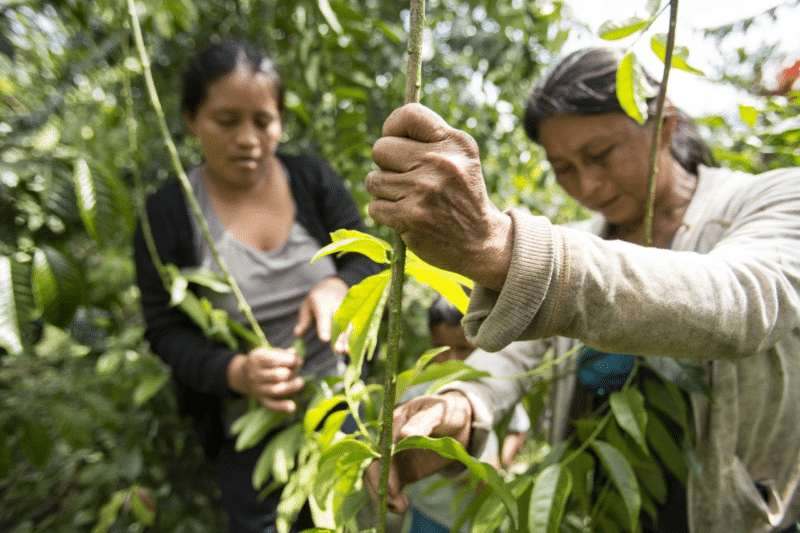
Never have we had so many opportunities to make ‘good’ choices for the planet. Certified bananas and coffee in your shopping cart, an array of eco-friendly vacations (when we can travel again!), t-shirts made of recycled materials—even your sex life can be greener with these sustainable condoms.
But as the sustainability market grows, so does competition to define “sustainable” in our lives. Amidst a sea of “green” and “should this” and “don’t that,” it’s people—and women, specifically— who get buried in an everchanging conversation. As we all strive to factor sustainability into our daily choices, it can feel increasingly like we are having to choose whether we care more about people or planet—as if somehow this could even be a choice.
So, what is “sustainable,” and how will you define it in your life?
Last year amid this seemingly endless pandemic I was celebrating having worked in the “sustainability” world for 20 years. Back in 2000 when I first set out it was not sustainability that was the buzzword of the day, then we talked of international development and ending poverty. Or, if you worked for an environmental charity—being “green.” And strangely it was rare for those inherently interconnected worlds to overlap.
Despite everything that 2020 threw at us, according to polls people realized that people and nature are inextricably linked—the wellbeing of one is central to the other and vice versa. Many are realizing now that sustainability is the true intersection of people, planet and profit—and this gives me hope for the future.
But still as an individual it can be hard to know if our actions are making a difference—what is the one thing I should be doing? Do I swap out my lightbulbs or urge my employer to partner with a women and coffee organization? The answer: It’s both!
Too often we think that just knowing about a problem will make people act differently. If we just knew that children worked in the cocoa fields that supplied our favorite brand of chocolate, we wouldn’t buy them, or if we knew workers picking our bananas didn’t earn enough, we would choose apples instead – but the truth is knowledge is rarely the barrier. It might be price, or taste or convenience that drive our behavior. And it is the same at scale—companies, workers and governments can be driven by everything but what is actually happening on the ground.
So, if we could begin to understand why people act or make the decisions they do, then, couldn’t we start to make a positive step forward together? What if we could all stay connected to sustainability as a practice in our everyday lives, not some intangible to-do list hanging over our heads?
Taking things a step further, with all the (important!) talk about reducing greenhouse gas emissions, we’re all but totally missing a massive force to combat climate change—women! It is often cited that the key to changing the world is investing in women, and study after study has demonstrated that educating girls is ranked as one of the top ten most powerful ways to reduce greenhouse gas emissions.
Women make up over half the people working in agriculture in developing nations. But simply providing them with knowledge is not enough – it is critical that they have the access to land and ownership to then be able to use this education on the ground. When I visited Côte d’Ivoire, I met Solange, a cocoa farmer who works with the Rainforest Alliance, who told me: “There is a huge difference of welfare and confidence between a woman owning her plot of land and a woman working on her husband’s land.”
If we just stop at education, we will not have gone far enough.
So what does this mean for us as individuals? We cannot possibly know the full picture of every producer we rely on, or company we buy from. How can we ensure we put people first in our daily choices?
The answer is simple – the first person to start with is you. Why do you want a more sustainable world? Is it because you still want to be able to enjoy the wonders of the forests and beaches for years to come? Is it because you love avocados or can’t live without chocolate, two crops threatened by climate change?
Once you know your personal inspiration you can start to think about the simple steps you might take. Choosing a certified product over another, looking for a new food waste recipe or supporting a project helping put people—and especially women—at the heart of change. The list goes on, and it matters.
We can’t save the world with a grocery cart, but we can make smarter choices for people and planet.
—
The Rainforest Alliance is an international non-profit organization working in more than 70 countries at the intersection of business, agriculture and forests. The Rainforest Alliance is creating a more sustainable world by using social and market forces to protect nature and improve the lives of farmers and forest communities.


